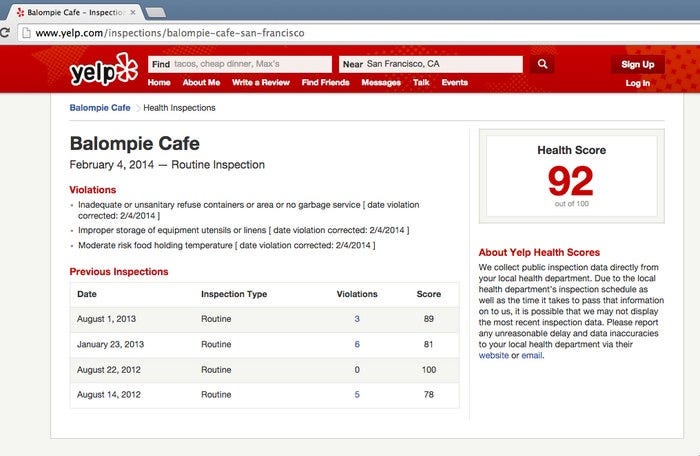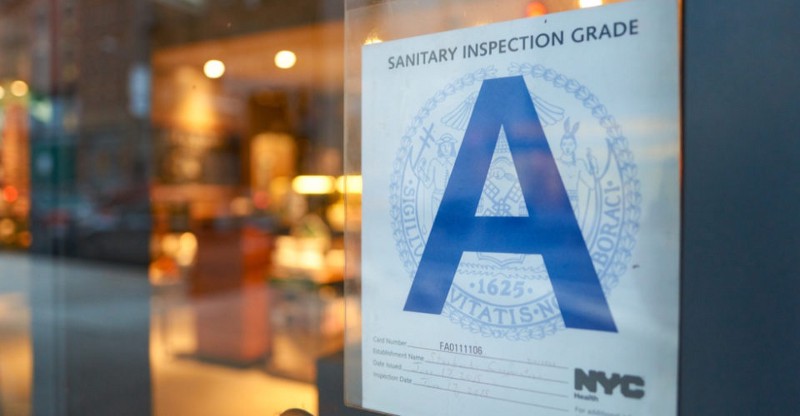I’ve been asking this question about once a week on Twitter to no avail:
Ringing this bell again as I haven’t gotten an answer: how are cities posting business’ #COVID reopening guidelines compliance? And is it being presented in a useful way to residents? #AreTheyWearingMasks#opendata #healthscores
— abhi nemani (@abhinemani) June 23, 2020
So I figured I must not be being clear enough… and will explain it here.
Here’s the idea: cities and counties already rigorously inspect local businesses on a whole host of things, ranging from fire prevention to plumbing. Crucially, counties perform inspections on local restaurants through their departments of public health (DPH). Yes you’ve probably seen that acronym “DPH” a lot over the last 3+ months; they are the tireless public servants on the ground coordinating COVID response: treatment and quarantine, testing sites, contact tracing, etc.
These local public health agencies set the rules for what a restaurant should do to be healthy and safe and then they periodically run inspections and generate scores publicly available to you and me, the consumer. (Those are the letter grades you see in the window of your favorite takeout place — see above.)
In a COVID world, we must adapt. The traditional indicators of health, cleanliness, and safety need to be augmented with the COVID safety rules: for example wearing masks, keeping tables 6 feet apart, etc. Indeed these COVID specific inspections and scores need to extend beyond restaurants to other commercial areas such as stores, malls, and even offices ought to be in compliance with the public health rules.
And arguably more importantly: if they are not in compliance we — as consumers and residents — ought to know that.
In our pandemic plagued cities, public health inspections are essential, and health inspection scores must include COVID safety compliance.
In our pandemic plagued cities, public health inspections are essential, and health inspection scores must include COVID safety compliance.
I am acutely passionate and optimistic around this topic because of the innovative work public health agencies, in partnership with local businesses and major internet sites, have already done with regular health inspections.

Years ago, the three came together to develop a “data standard” on how to openly publish inspection scores for restaurants so residents didn’t have to go searching within the restaurant (after they sat down!) for its grade. The score is visible on Yelp and in other apps, so you can make an informed choice on where you go. This is open data at work, following the mantra, “Make all apps more civic,” taking data previously hidden and placing it into the palm of your (disinfected) hand. This is open data at work, following the mantra, “Make all apps more civic,” taking data previously hidden and placing it into the palm of your (disinfected) hand.
This kind of innovation is more urgent in the midst of this crisis. You do not want to go to a restaurant and only after eating spot the kitchen staff walking around without masks. You should know that before you walk through the door; in fact, you should know that before you make plans. Because with that, and the attendant shift in consumer demand, we can subtlety encourage greater compliance with COVID regulations, and so support healthier communities.
Here’s what we need:
- Translation of state or county COVID guidelines into an actionable checklist of sorts
- Development of a methodology to assess checklist and generate scores or grades
- Proactive inspections of places or businesses to assess their COVID compliance — this by the way should also include assessing the business’ enforcement of COVID rules on patrons (eg wearing masks)
- Proactive publication of those scores by public health agencies in standardized formats. (Let’s keep this simple; see below.)
- Integration of these scores into popular consumer platforms such as Yelp, Google Places, Apple Maps, Foursquare, Facebook etc
This pandemic if nothing else has taught us that the decisions each of us make deeply affects those around us. We need to be able to talk about what’s going on openly and candidly, and that requires data and the communication of that data. It’s time we as residents, business owners, and local leaders, step up and hold each other accountable for our actions.
N.B. To illustrate how the COVID compliance grade would augment existing health inspection scores, consider the ideal schema of the rolled up dataset on restaurants: _“Business ID”, “Business Name”, “Open/Closed”, “Healthscore”, “Covid Compliance Score”.

